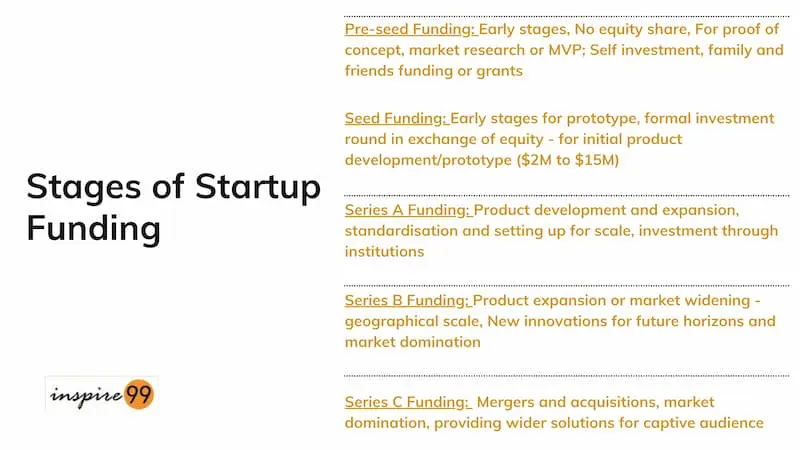Startup Funding: Funding is one of the most commonly researched topics about startups. Honestly speaking it is one of the hardest things to do in the early stages of the startup, particularly when there are no sales and early products to capture customer feedback. As hard as it sounds, there are of course multiple opportunities for startups to raise funds.
The easiest way is to raise money through self-funding or a family and friends approach. however, if you are looking for more investment, the equity funding approach allows you to approach aggressively. Depending on the type of your business, you can consider different funding opportunities that help your idea scale.
Types of Startup Funding
The most common types of startup funding are – family and friends, loans & grants and equity investment. There may be some additional sub-types, but they can all be grouped under these three broad segments. These funding routes are not mutually exclusive. Sometimes you can find businesses that have all these three stages. Ultimately funding is so hard that entrepreneurs sometimes will be forced to take any route that’s most feasible for them.

However when most people refer to funding they are invariably referring to equity-based funding. This type of investment will require you to share a part of the business ownership in exchange of money. Various investors will be interested in this route as we will explore below.
Family and friends
This is the foremost and easiest way to raise funds. This is because you don’t have to go through the same rigor as in case of business investments. Most people in this stage invest in you because they believe in you more than the idea. They are less knowledgeable about the market but want to show their support in your venture. This is all about your social capital, goodwill and people that you know and believe in you.
Loans
Loans are more serious, you’ll need to submit collateral, take personal liability etc. Loans are harder because they increase the risk that you take. Even if the business fails, you’d still have to pay back these loans. You might get some support such as guarantors, etc for these loans. But they are still harsh because you take all the risk and don’t have huge support when things go wrong. On the other hand, getting loans is easier compared to equity funding because the level of scrutiny is lower. Above all, you still will own 100% of your equity without having to compromise your ownership.
Grant Funding
Startup Grants are a great way to raise funds if you can. Government grants and funds provide you funds to develop or market your business idea depending on the impact of your business idea. If your business idea has a social impact or is in an area of focus from the govt agenda, it increases your chances at these funds.
Equity Funding, Crowdfunding etc
During the early stages, seed investment is a fantastic way to raise capital. These are usually called angel investors who invest in your business for a % of your equity. Although they get a larger % than in later stages of funding, they still take a bigger risk since your idea is unproven. However, as your business grows, you can take funding from Series A, B or C for the expansion stages of a startup. This is explained in the following segment.
If your product is simple enough to understand and explain in a short video – crowdfunding is a great way to raise funds. It allows you to talk to potential customers or investors and raise funds based on the popularity of your idea. Please note, it takes a lot of effort to make this video appealing to customers and ensure that it catches their attention.
Different Stages of Startup Funding
There are typically 3 stages of funding for a startup. These funding stages are classified under equity funding where you’ll give up a part of your company’s ownership/stake in exchange for money. This money will be used to develop the product or expand the scale and scope of your startup depending on its maturity.

Pre seed funding and Seed Funding
This occurs during early stages of the startup. Pre-seed funding is used to develop the proof of concept or initial operations of the business. The ideal outcome of a pre-seed fund is to be able to develop a minimum viable product that can be used as proof of success for next stage of business development. Incubators are great places to support opportunities for pre-seed funding. Some pre-seed funds come as a part of incubators or even some university funds that can be very handy. Other routes of pre-seed funding are family and friends or self-investment.
Seed Funding: During the pre-seed fund, we normally don’t give out any equity. The first time you focus on equity funding is during the seed funding stage. By this stage, you’ll already have a credible business plan, a minimum viable product and some early customer feedback to support your idea. At this stage, angel investors are more forgiving about the detail in your approach and the early stages of product development. A seed stage represents a high risk for an investor and naturally, they will get a higher % of the ownership of your company as compared to investing in the later stages of your startup.
While you’re asking for seed funding, make sure that your business plan is built for scale and covers situations of future fundraisers. They will ask you questions about dilution and reduction in share value in further rounds as you raise further investment.
Series A, Series B and Series C Funding
After the seed funding round, your next equity fundraiser is Series A funding. The seed fund is generally used for product development. In Series A funding, investors will expect a level of success from a startup. At this stage, they will also expect your startup to have some initial customers. In an ideal world, they’d like to see some impressive customer names to add credibility to your product.
Series A funding is to expand the business and increase the product adoption. Before this stage, you should have completed the product prototype and even the first delivery. Series A funds raise from $2M to $15M according to Investopedia. The minimum expectation however is that your idea has progressed from an idea stage to actual product with a few adopters.
Series B Funding
Series B funding is all about market expansion. Remember, the purpose of a startup is to scale and provide a repeatable business model. In this stage, the investors will expect you to have an expansion plan. Sometimes, these expansion plans in Series B funding are about setting up genuine new companies to expand your market share. geographical units and expanding the size of the customer base. The business at this stage has already entered the inorganic growth phase where the mantra is to sell and sell more. You can use a part of this investment for continuous product development. But this should feed into your expansion plans and future innovations to increase customer appetite on your solutions. You should be well beyond product market fit while applying for series B funding.
Series C Funding
Series C funding is exciting. At this stage, you already have a successful business and are looking for further expansion. This expansion can come in the form of acquisitions, buying out other companies to expand your market share. At this stage, you’re well beyond startup phases and into business domination. Series C startups command large valuations and are ripe for a great buyout themselves. It is looking for rapid expansion in the market and this comes with significant investment to ramp up sales and marketing functions. If you’re lucky, you’ll be able to focus on next-horizon investments that can be very exciting.
These are the types of investments you can focus on as a startup founder. Depending on the goals of your startup, define your investment plan to reach out to the right investors.

Pingback: 4 Distinct Factors of a Small Business Entrepreneurship - Inspire99
Pingback: 5 salient features of a partnership business - Inspire99
Pingback: No more romanticizing about how cool is it to be an entrepreneur - Inspire99
Pingback: 4 Key Facets of having your skin in the game in a startup - Inspire99
Pingback: 9 Key Areas of Business Model Canvas for an Entrepreneur - Inspire99
Pingback: Shoestring Budget: 5 Low-Investment Startup Ideas - Inspire99
Pingback: 5 Key Points on What startup accelerators really do - Inspire99
Pingback: Does the SVB collapse mean a tidal wave of Startup Layoffs? - Inspire99
Pingback: What is a startup- 4 differences with small business - Inspire99
Pingback: Presentations in a small business and startup - Inspire99
Pingback: 4 Steps on How to turn your idea into business - Inspire99
Pingback: Four Types of Entrepreneurship for a Founder - Inspire99
Pingback: 5 Key Differences between and entrepreneur and intrapreneur - Inspire99
Pingback: 5 strategic steps for your startup branding - Inspire99
Pingback: 4 Methods, How to build a startup with no money? - Inspire99
Pingback: Money is like gasoline during a roadtrip! - Inspire99
Pingback: Do not focus on numbers, focus on what you do best - Inspire99
Pingback: Don’t assume that borrowing lots of money can make your startup fly! - Inspire99
Pingback: 3 Key points on How to get funding for startup - Inspire99
Pingback: 5 Reasons to read The Infinite Game for a startup - Inspire99